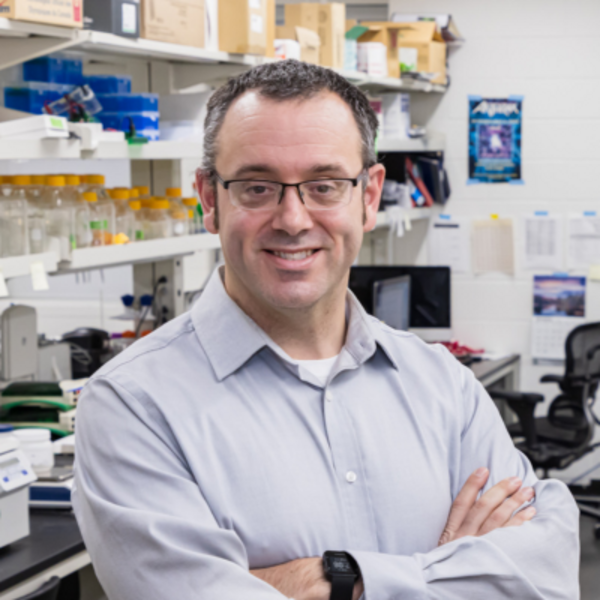Main Second Level Navigation
Scott Yuzwa
PhD

Scott Yuzwa is an Assistant Professor in the Department of Laboratory Medicine and Pathobiology. He obtained in his PhD in Molecular Biochemistry & Biochemistry at Simon Fraser University and carried out postdoctoral training at the Hospital for Sick Children.
Research Synopsis
My laboratory uses neurobiological, high-throughput and bioinformatic approaches to characterize molecular mechanisms which control cell fate decisions of neural precursor cells in the developing and mature brain.
The assembly and maintenance of the mammalian brain by neural precursor cells (NPCs), are tightly regulated processes, which involve integration of intrinsic transcriptional programs with extrinsic information from the cellular microenvironment to ensure that the correct cell types are produced, at the right time, to establish functional circuits. Our major goal is to understand using a mixture of neurobiological, high-throughput and bioinformatic approaches how NPCs, sense their microenvironments, interpret this information and ultimately decide how to respond accordingly. Understanding how extrinsic cues control NPCs has the potential to inform novel therapeutic strategies aimed at activating these cells for repair following brain injury or disease. We are pursuing research in two major areas.
First, we have recently identified using single-cell genomics, a key ‘on/off’ switch which controls proliferation of radial precursor (RPs) cells in the developing brain by modulating their response to the cellular microenvironment. We aim to understand how this switch allows RPs to become ‘slow-dividing’ and persist into the adult brain to give rise to adult neural stem cells (NSCs). Leveraging a deep understanding of this ‘on/off switch,’ we aim to develop approaches to force this switch into the ‘off’ position thereby mobilizing NSCs following brain injury or disease.
Second, tissue resident stem cells such as adult NSCs are housed in specialize niche microenvironments with well defined cellular architectures. Spatial information is therefore critical in understanding the identity and sources of extrinsic cues which control NSC cell fate decisions. We are developing and applying methods to add spatial level information to transcriptomic data and thereby reveal the complexity of extrinsic regulation in the NSC niche.
Selected Publications
Carr MJ, Toma JS, Johnston APW, Steadman PE, Yuzwa SA, Mahmud N, Frankland PW, Kaplan DR, Miller FD. "Mesenchymal Precursor Cells in Adult Nerves Contribute to Mammalian Tissue Repair and Regeneration." Cell Stem Cell, DOI: 10.1016/j.stem.2018.10.024.
Zahr SK, Yang G, Kazan H, Borrett MJ, Yuzwa SA, Voronova A, Kaplan DR, Miller FD. "A translational repression complex in developing mammalian neural stem cells that regulates neuronal specification." Neuron. (97) 520-537 (2018).
Yuzwa SA*, Borrett MJ*, Innes BT, Voronova A, Ketela T, Kaplan DR, Bader GD, Miller FD. "Developmental emergence of adult neural stem cells as revealed by single cell transcriptional profiling." Cell Reports (21) 3970-3986 (2017) *Indicates equal contribution.
Voronova A, Yuzwa SA, Wang B, Zahr S, Syal C, Wang J, Kaplan DR, Miller FD. "Migrating Interneurons Secrete Fractalkine to Promote Oligodendrocyte Formation in the Developing Mammalian Brain." Neuron. (94) 500-516 (2017).
Ravindran E, Hu H, Yuzwa SA, Hernandez-Miranda LR, Kraemer N, Ninnemann O, Musante L, Boltshauser E, Schindler D, Hübner A, Reinecker H, Ropers H, Birchmeier C, Miller FD, Wienker TF, Hubner C, Kaindl AM "Homozygous ARHGEF2 Mutation Causes Intellectual Disability and midbrain-hindbrain malformation" PLOS Genetics. 13(4) e1006746 (2017).
Yuzwa SA*, and Miller FD*. "Deciphering cell-cell communication in the developing mammalian brain." Neurogenesis. 4(1) e1286425 (2017) *Indicated co-corresponding author.
Yuzwa SA.*, and Vocadlo DJ. "Production of O-GlcNAc modified recombinant tau in E.coli and detection of Ser400 O-GlcNAc tau in vivo." Methods in Molecular Biology: Tau Protein. (1523) 237-248 (2017). *Indicates corresponding author.
Yuzwa SA, Yang G, Borrett M, Clarke G, Cancino GI, Zahr S, Zandstra PW, Kaplan DR, Miller FD. "Proneurogenic Ligands Defined by Modeling Developing Cortex Growth Factor Communication Networks." Neuron. (91) 988-1004 (2016).
Johnston APW, Yuzwa SA*, Carr M*, Krause MP, Mahmud N, Storer MA, Jones K, Paul S, Kaplan DR, Miller FD. "Dedifferentiated Schwann Cell Precursors Secreting Paracrine Factors Are Required for Regeneration of the Mammalian Digit Tip." Cell Stem Cell. (19) 433-448. (2016). *Indicates equal contribution.
Naska S*, Yuzwa SA*, Johnston APW, Paul S, Smith K, Paris M, Datti A, Miller FD, Kaplan DR. "Identification of drugs that regulate dermal stem cells and enhance skin repair." Stem Cell Reports. 6(1) 74-84 (2016). *Indicates equal contribution.
Yuzwa SA*, Shan X*, Jones BA, Zhao G, Li X, McEachern EJ, Watson NV, Gong C-X, Vocadlo DJ. "Pharmacological Inhibition of O-GlcNAcase (OGA) prevents cognitive decline and amyloid plaque formation in bigenic tau/APP mutant mice." Mol Neurodegener. 9(42) (2014) *Indicates equal contribution.
Yuzwa SA*, Cheung A*, Okon M, McIntosh L, Vocadlo DJ. "O-GlcNAc modification of tau directly inhibits its aggregation without perturbing the conformational properties of tau monomers." J Mol Biol. 426(8) 1736-1752 (2014) *Indicates equal contribution.
Yuzwa SA*, Shan X*, Macauley MS, Clark T, Skorobogatko Y, Vosseller K and Vocadlo DJ. "Increasing O-GlcNAc slows neurodegeneration and stabilizes tau against aggregation." Nat Chem. Biol. 8 (4) 393-399 (2012) *Indicates equal contribution.
Yuzwa SA, Yadav AK, Skorobogatko Y, Clark T, Vosseller K, Vocadlo DJ. "Mapping O-GlcNAc modification sites on tau and generation of a site-specific O-GlcNAc tau antibody. Amino Acids 40 (3) 857-868 (2011).
Yuzwa SA, Macauley MS, Heinonen JE, Shan X, Dennis RJ, Yuan He, Whitworth GE, Stubbs KA, McEachern EJ, Davies GJ and Vocadlo DJ. "A potent mechanism-inspired O-GlcNAcase inhibitor that blocks phosphorylation of Tau in vivo." Nat Chem. Biol. 4, 483-490 (2008).
Awards and Honours
LMP Teaching Excellence in Graduate Education Award (2024)
